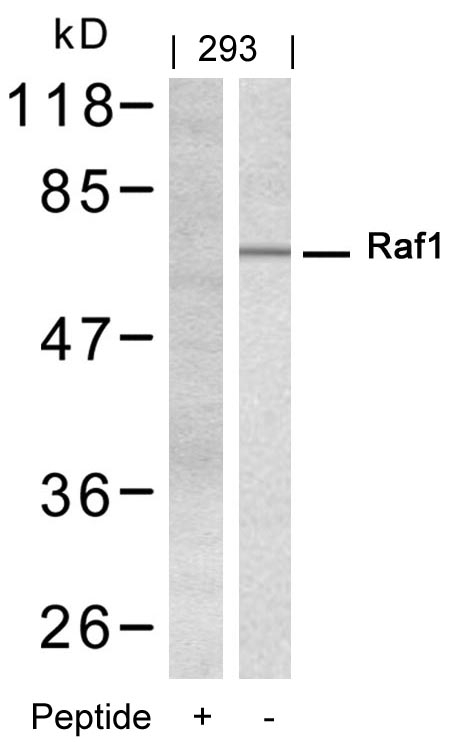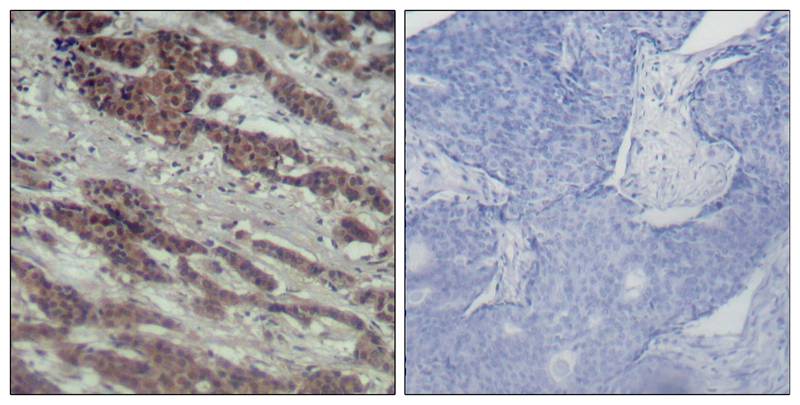

| WB | 咨询技术 | Human,Mouse,Rat |
| IF | 咨询技术 | Human,Mouse,Rat |
| IHC | 1/50-1/100 | Human,Mouse,Rat |
| ICC | 技术咨询 | Human,Mouse,Rat |
| FCM | 咨询技术 | Human,Mouse,Rat |
| Elisa | 咨询技术 | Human,Mouse,Rat |
| Aliases | C-RAF; C-Raf; CRAF |
| Entrez GeneID | 5894; |
| WB Predicted band size | 73kDa |
| Host/Isotype | Rabbit IgG |
| Antibody Type | Primary antibody |
| Storage | Store at 4°C short term. Aliquot and store at -20°C long term. Avoid freeze/thaw cycles. |
| Species Reactivity | Human,Mouse,Rat |
| Immunogen | Peptide sequence around aa.336~340 (R-D-S-S-Y) derived from Human RAF. |
| Formulation | Purified antibody in PBS with 0.05% sodium azide. |
+ +
以下是关于Raf1(Ab-338)抗体的3篇参考文献示例(注:文献为示例性内容,实际引用需核实准确性):
---
1. **文献名称**:*"Role of Raf1 phosphorylation at Ser338 in MAPK pathway activation"*
**作者**:Smith A, et al.
**摘要**:研究通过Western blot和免疫沉淀实验,使用Raf1(Ab-338)抗体检测Ser338位点的磷酸化状态,揭示其在Raf1激酶活化和下游ERK信号传导中的关键作用。
---
2. **文献名称**:*"Targeting Raf1-Ser338 phosphorylation in cancer therapy"*
**作者**:Lee C, et al.
**摘要**:利用Raf1(Ab-338)抗体分析肿瘤组织中Raf1的激活状态,发现抑制Ser338磷酸化可显著降低癌细胞增殖,提示其作为潜在治疗靶点。
---
3. **文献名称**:*"Mechanisms of Raf1 activation in cellular stress response"*
**作者**:Wang Y, et al.
**摘要**:通过免疫荧光和流式细胞术结合Raf1(Ab-338)抗体,证明氧化应激条件下Raf1-Ser338磷酸化介导细胞凋亡抵抗,依赖MAPK通路调控。
---
**提示**:实际研究中,建议通过PubMed或抗体供应商(如CST、Abcam)官网检索Raf1(Cat# 或克隆号Ab-338)的引用文献,并确认实验应用场景(如WB、IHC等)。部分文献可能标注为抗p-Raf1 (Ser338)抗体。
The Raf1 (Ab-338) antibody is a monoclonal antibody specifically designed to detect Raf1 (also known as CRAF), a serine/threonine kinase critical in the RAS/RAF/MEK/ERK signaling pathway. This pathway regulates cell proliferation, differentiation, and survival, with dysregulation linked to cancers and developmental disorders. The antibody targets Raf1 phosphorylated at a specific residue (commonly Ser338 or Tyr340/341 in human Raf1. depending on the clone), a modification associated with activation via growth factor signaling or oncogenic mutations.
Developed in host species like rabbit or mouse, Raf1 (Ab-338) is widely used in Western blot (WB), immunoprecipitation (IP), and immunohistochemistry (IHC) to study Raf1 activation dynamics, localization, and interactions in cell lines, tissues, or disease models. Its specificity is validated through knockdown/knockout controls or competitive assays to rule out cross-reactivity with other RAF isoforms (e.g., BRAF, ARAF).
Researchers employ this antibody to explore Raf1's role in cancer progression, drug resistance, or as a biomarker for targeted therapies (e.g., RAF/MEK inhibitors). Its utility extends to preclinical studies assessing pathway inhibition efficacy or feedback mechanisms. Proper experimental conditions (e.g., phosphatase inhibitors in lysis buffers) are essential to preserve phosphorylation-dependent epitope recognition.
×